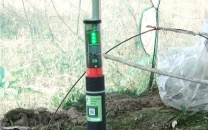Imran, Qureshi’s acquittals in cypher case challenged in SC
Interior ministry says ‘overwhelming evidence’ of prosecution was ignored in case

The interior ministry on Thursday challenged the acquittal of PTI founder Imran Khan and former foreign minister Shah Mahmood Qureshi in the cipher case before the Supreme Court.
The ministry, in its appeal, adopted the stance that the Islamabad High Court (IHC) did not have the authority to hear the duo’s appeals in the case, adding that the “overwhelming evidence” of the prosecution was ignored.
The cipher case originated from Imran's public display of a paper during a rally in Islamabad on March 27, 2022, claiming it as evidence of an "international conspiracy" before a vote of no-confidence led to his government's ouster.
On January 30, a special court established under the Official Secrets Act awarded Imran and Qureshi 10 years’ imprisonment in the case. Later, both the leaders appealed against the verdict in the IHC.
On June 3, the IHC acquitted both the leaders, suspending their 10-year sentence.
On Thursday, the interior ministry’ appeal maintained that the Official Secrets Act (OSA), 1923 did not provide the provision of filing an appeal against the judgment of the special court judge and that the IHC did not “appreciate” that it lacked the jurisdiction or power to create rights which were not provided by the Constitution or a validly enacted law.
Also read: IHC acquits Imran Khan, Shah Mahmood Qureshi in cipher case
“It is an established principle of law that where the legislature has not provided something in the language of the law, the court cannot travel beyond its jurisdiction and read something to the law as the same would be ultra vires the powers available to the court under the Constitution and would constitute an order without jurisdiction,” the appeal noted.
It stated that Imran and Qureshi were non-cooperative during the cipher trial, adding that it was proven from record that both the accused had filed 65 different pleas during the trial.
It further said that during the case, witnesses appeared before the court but the counsels of the accused did not cross-examine them.
“The conduct of the respondents was non-cooperative throughout the trial and they made every possible efforts to delay the proceedings. The record of the trial court is evidence of the fact that 65 miscellaneous applications moved by the respondents were heard and decided by the trial court.
“The matter was number of times adjourned on the request of the respondents or their counsels. The witnesses remained present in the court but their cross-examination was not carried out by the defence counsels. The learned trial court appointed the defence counsels on the expense of the state, who had completed the trial. The respondents tried to defeat the cause of justice by indefinite procrastination,” the appeal said, adding that these aspects were not considered by the IHC.
The appeal reasoned that it was a “settled principle of law” that if a court came to the conclusion that a trial was not carried out fairly then the “only way out provided under the law is to remand the matter to the trial court for giving proper opportunity”.
It said the prosecution had produced “overwhelming evidence” in support of its case and the admission by the accused was “sufficient to establish the case beyond any shadow of doubt”.
“Prosecution has produced the documentary evidence along with its forensic analysis through reliable and confidence inspiring evidence which were not negated during the course of the cross-examination but this aspect has not been appreciated by the honourable division bench of IHC, while acquitting the respondents, as such the impugned judgment is not sustainable in the eyes of law.
“That the impugned judgment/short order does not reflect any ground of acquittal of the respondent, even it is not observed that the prosecution has failed to prove its case beyond any shadow of doubt.
“That with utmost respect it submitted that the IHC has not appreciated the evidence available on the record as well as the admission of the accused, while acquitting the respondents, as such the impugned judgment is not sustainable in the eyes of law,” the appeal noted.
The interior ministry urged the apex court to fix its appeal for hearing.



















COMMENTS
Comments are moderated and generally will be posted if they are on-topic and not abusive.
For more information, please see our Comments FAQ